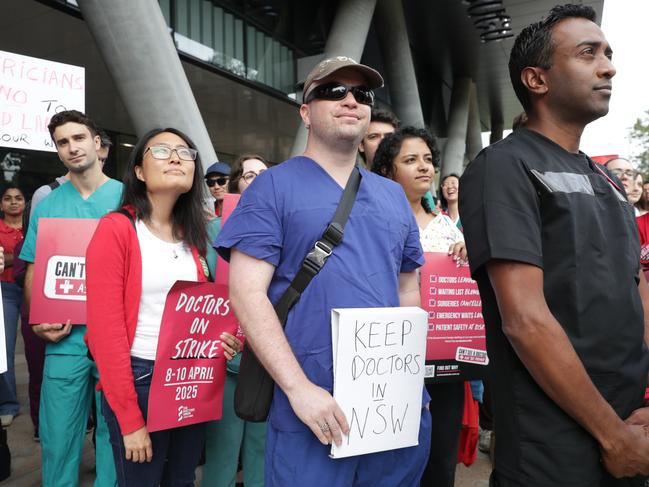Political cynicism and Band-Aid solutions miss key point of our health system dilemma
There’s one big thing missing in our national conversation about health – individual responsibility.

No clinician can forget the controlled rage experienced when attempting to locate a nonexistent bed at 3am for an acute mental admission. Nor the warm wet stench of groin fold thrush in the futile search for femoral vein access in a young obese patient. There is a signature dry-mouth emotional numbness of breaking bad news unnecessarily; a lost limb due to delayed treatment or an entirely preventable bowel cancer diagnosed at stage 4 in a 50-year-old who failed to do a free screening test.
These sensations unleash a floodgate in my mind’s eye – unravelling years of suppressed anger, heartbreak and moral injury exacted as a public hospital doctor.
In the midst of a looming healthcare crisis that threatens to implode under its own weight, during the 2025 federal election campaign Labor’s recent major promises including an $8bn injection into Medicare, $3.2bn into cheaper medicines and $1.8bn to reduce waiting times for hospitals might appear heroic.
Yet this colossal outlay is more about shoring up political capital than meaningfully fixing top-of-funnel demand or the system’s deep-seated dysfunction. It’s a calculated move to placate swing voters rather than heal a sickly healthcare architecture. Beneath the veneer of hope lies a persistent mirage: taxpayer dollars being flung at a flawed model – without fundamental redesign – propping up political theatre, leaving population health stagnant, at best.
Australia’s healthcare: drunk on a tightrope
Australia’s healthcare system, like so many in the developed West, is not just wobbling; it’s careening toward catastrophe like a drunk on a tightrope. Striking doctors and psychiatrist walkouts notwithstanding, our problems extend beyond workforce, rising costs and diminishing returns; they stem from a pervasive national mindset that treats healthcare as a “debt” – something to be grudgingly paid for rather than an investment in long-term wellbeing. Moreover, our system falsely frames individual health as an entitlement, not a hard-won asset.

This collective and individual mindset sees a paltry 1.5 per cent of our health budget – barely 0.13 per cent of GDP – allocated to keeping people well. Instead, we funnel vast sums into reactive measures, administrative overheads and a pharmaceutical arms race. We play whack-a-mole with symptoms instead of tackling root causes – or, better still, the causes of the causes.
Australia’s preventive health expenditure, just $89 per person, per year, is dwarfed by the OECD average, revealing our skewed reliance on reactive care rather than clinician and patient behaviour change. For perspective, the overall health budget is about $132bn a year in Australia. In other words, the federal government allocated roughly 0.1 per cent of our health spending to new prevention measures, and 99.9 per cent to treating people after they get sick or old – algorithms that move the dial. Consider these sobering figures:
• 15.2 per cent of Australia’s $734bn 2024-25 federal budget is allocated to health, yet more than one-third (38 per cent) of our total disease burden was preventable
• From 2003 to 2023, mental and substance use disorders experienced a 30.9 per cent increase in the standardised rate and a 73.8 per cent increase in the burden of disability
• Despite high life expectancy, Australian men and women now spend 9.7 and 11.5 years, respectively, in ill-health – a rise of about 20 per cent since 2003.
For those schooled in the social determinants of disease; we are all too aware of the painful correlation between socioeconomic status, disadvantage and ill-health.
Cultural gaslighting
Part of this is because we have become a people narcotised by learned helplessness and governed by a pervasive sense that the system owes us. This personality cancer is on view through chronic disease indicators that compound reliance on reactive care.
The tragedy of our times is marked by a cultural gaslighting of biblical proportions – the belief that clinicians can somehow outrun systemic societal dysfunction. Equally, that individuals can be passive or medicate or inject their way to health. This delusion ignores the structural issues at play.
Instead of investing in boring, long-haul strategies that might stop Australians from getting sick in the first place or, better still, improve risk, our leaders shovel cash into the latest downstream quick-fix. But consumers, too, seem all too willing to take what they believe is the easy path, oblivious to the risk of side-effects. Enter the Ozempic craze: a weekly jab that costs nearly $2000 a year per patient, subsidised for diabetes and with mounting pressure to extend that largesse to weight loss too. The taxpayer, of course, is expected to foot the bill for this “miracle” drug, but there seems to be no shortage of consumers willing to pay big for what they see as the quick route to losing weight. The real miracle is how deftly Big Pharma and Big Food have managed to turn chronic illness into a perpetual motion machine for profit. Ozempic is transformative for some. But let’s not kid ourselves about why so many Australians need a $150-a-month injection in the first place. Our society manufactures chronic illness at scale: junk-food marketing, food deserts, sedentary lifestyles, stress, inequality – the whole sick circus.

Instead of tackling these upstream, our government is content to treat bodies like something to pawn and tax dollars like Monopoly money, and we are playing along.
Too often, the concept of “personal responsibility” is wielded as a pejorative political weapon rather than a constructive principle. In truth, good governance – like loving parenting – should aim to maximise individual agency, not perpetuate cycles of futile Band-Aids or individual dependency.
Central to this is the federal health budget’s gaping omission centring on two distinct and related pathologies; an escalating mental health crisis and anaemic investment in prevention.
Mental health: the forgotten subtext
Australia’s mental health epidemic is not a stand-alone “illness” – it is the fallout of decades of broken social contract, disintegrating relational capital, rising cost-of-living pressures and unresolved grief-related loss of function in people’s lives. The uncomfortable truth is that the majority of mental health problems, such as depression and anxiety, are the predictable sequelae of bad design that engineers the loss of hope and collapse of social and economic prospects. Let’s not pretend we’re stumped by this either. The evidence is as thick as a Sydney property developer’s wallet: prevention works. Study after study, review after review, find these interventions are cost-effective, sometimes even cost-saving. Secure housing, purposeful work, social warmth and accessible counselling – these are not radical ideas, they’re the equivalent of putting air in your tyres before the blowout.
Yet the government’s idea of progress is renaming and reshuffling programs. When one in five young Australians meets criteria for a serious mental illness, governments pour money into select programs.
Australian governments have poured an eye-watering $1bn into headspace clinics since their inception. Orygen, the National Centre of Excellence in Youth Mental Health, played a key role in the development and establishment of headspace and now operates several headspace centres as well as providing clinical programs to schools and other organisations. According to prominent academic psychiatrist Professor Jeffrey CL Looi, there is little compelling evidence that the premise of prevention has been proven by Orygen - a claim fiercely disputed by the organisation.

Despite a significant investment in heaspace clinics and to a lesser extent, in Orygen directly, over almost 20 years, youth mental health outcomes – assessed through population-level indicators such as psychological distress, self-harm and suicide – have worsened during this period. Of course, there have been other trends in society affecting young people, including the rise of social media; however, it is questionable whether the investment in youth services has effectively addressed the pathology that has arisen.
Opposition health spokeswoman Anne Ruston’s response to the federal budget was a vision-free zone. The Coalition blindly and immediately adopted the government’s bulk-billing policy, which is being widely lambasted by doctors as incentivising fast medicine. The Liberals’ biggest pitch during the election campaign was to reinstate 20 (versus 10) subsidised psychology sessions – despite the fact evaluations have shown such sessions are mostly utilised by the privileged and reduce overall access. The idea to establish an ill-defined “national youth mental health institute” is as bold as a decaf latte.
Even the Australian Medical Association, not exactly a hotbed of radicalism, has blasted the government for ignoring calls to let GPs and psychiatrists set their own fees and cut the red tape.
Re-imagining health: from necessary expense to asset
If the proof is in the pudding, then Australians have gorged on debt to the point of reflux. For all its purported generosity, our healthcare expenditure underperforms. It’s as if the government looked at a raging dumpster fire and declared: “Perfect, let’s toss more cash in.”
According to a report prepared by the Menzies & George Institute, and backed by the University of Sydney and ANU, barely 3 per cent of Medicare Benefits Schedule items (less than 1 per cent of total healthcare spend) have been rigorously evaluated against contemporary standards for safety, clinical and cost effectiveness. Worse still, this same review flagged more than 150 high-volume clinical services on the Medicare Benefits Schedule that are either unsafe, ineffective or inappropriate under certain circumstances. It’s Russian roulette with your health – but with 150 bullets in the chamber.
Collectively, the MBS and PBS, along with much of what takes place in hospitals, are all prime examples of reactive care – they are by their very creation squandering what should be the nation’s shared wealth – our common wealth.
The truth is that the change we require demands both a transformed investment mandate from the public purse and the active co-operation of individuals to resolve. We must collectively wake up to the fact that our bodies and minds are not credit cards to be maxed out; they are our most valuable assets.
A new vision: collective & individual investment mindset
Real progress requires a bold, transformative mindset – one that views healthcare as an investment in our collective future rather than a fleeting political slogan or a number in a doomed budget plan. We owe it to ourselves and future generations to advocate for a system that truly prioritises and safeguards our shared mental and future wellbeing. It is equally crucial to empower individuals to take an active role in nurturing their own health as the most previous thing they own.
What we need now is courageous policymaking and a cultural shift in the way we approach health management. Every dollar spent must be seen as an investment in the nation’s future, not merely a cost to be balanced at the end of the fiscal year. Only by embracing such a vision can we, as a nation, truly demonstrate our commitment to the health and prosperity of every Australian.
Mei Ling Doery is a medical doctor and public health advocate, and the managing director of the healthcare and innovation consultancy MDMD. She is a previous board member of statutory agency VicHealth a medical adviser to the Department of Veterans’ Affairs, Medical Officer for the Australian Defence Force, and team doctor for the AFL’s Richmond Tigers reserves.



